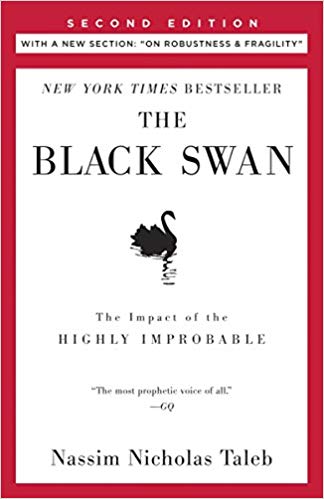

This article is an excerpt from the Shortform summary of "The Black Swan" by Nassim Taleb. Shortform has the world's best summaries of books you should be reading.
Like this article? Sign up for a free trial here .
Who is Nassim Nicholas Taleb? How did he develop his popular “black swan” theory?
The Black Swan is the second book in former options trader Nassim Nicholas Taleb’s five-volume series on uncertainty. This book analyzes so-called “Black Swans”—extremely unpredictable events that have massive impacts on human society.
We’ll explore how Nassim Nicholas Taleb became obsessed with probability (or, more accurately, improbability) and how he developed his theory of black swans.
Nassim Nicholas Taleb & Black Swans
The Black Swan is named after a classic error of induction wherein an observer assumes that because all the swans he’s seen are white, all swans must be white. Black Swans have three salient features:
- They are rare (statistical outliers);
- They are disproportionately impactful; and, because of that outsize impact,
- They compel human beings to explain why they happened—to show, after the fact, that they were indeed predictable.
Nassim Nicholas Taleb’s thesis, however, is that Black Swans, by their very nature, are always unpredictable—they are the “unknown unknowns” for which even our most comprehensive models can’t account. The fall of the Berlin Wall, the 1987 stock market crash, the creation of the Internet, 9/11, the 2008 financial crisis—all are Black Swans.
Once Nassim Nicholas Taleb introduces the concept of the Black Swan, he delves into human society and psychology, analyzing why modern civilization invites wild randomness and why humans can neither accept nor control that randomness.
The Origins of Nassim Nicholas Taleb’s Black Swan Obsession
Nassim Nicholas Taleb’s first encounter with a Black Swan took place in his home country of Lebanon.
For centuries, the region around Mount Lebanon was known for its cosmopolitanism—located on the eastern shore of the Mediterranean, at the crossroads of Europe and the Near East, it was home to a vibrant mercantile population that included Christians and Muslims of various sects, Jews, and Druze.
This tolerant and multicultural paradise was still in existence in Taleb’s youth. He recalls the motley crew of international playboys, spies, writers, and merchants that frequented the country.
Taleb was part of the country’s aristocracy. Both of his grandfathers were educated in France, and one of them was serving as minister of the interior when a teenaged Nassim Nicholas Taleb was jailed for participating in a political rally that turned violent. The government was scared enough of the unrest to grant all the arrested protesters amnesty.
Shortly after the rally came the Black Swan that launched Taleb’s obsession: A civil war between Lebanon’s Muslims and Christians that shattered the country’s millennia-long ethnic peace and reduced Beirut, Lebanon’s capital and the “Paris of the Middle East,” to rubble.
What this Black Swan brought home for Nassim Nicholas Taleb was the blunt unknowability of history. The war wasn’t—couldn’t have been—predicted; it could only be explained after the fact. He realized that human beings suffer from a “triplet of opacity” when it comes to our encounters with history:
1) The Illusion of Understanding
We all tend to think we have a grasp of what’s going on in the world when, in fact, the world is far more complex than we know.
For example, all the adults around Nassim Nicholas Taleb predicted the civil crisis would last a matter of days (it ended up lasting around 17 years). Despite the fact that events kept contradicting people’s forecasts, people acted each day as though nothing exceptional had occurred.
2) The Retrospective Distortion
History always appears predictable (or, at least, explainable) in our retrospective accounts of events.
In the case of the Lebanese Civil War, the adults whose forecasts were continually proved incorrect were always able to explain the surprising events after the fact. In other words, the events always were indeed predictable, but one could only predict them after they’d already happened.
3) The Overvaluation of Facts and the Flaw of Expertise
We accumulate information and listen to expert analysis of that information, but these elements never measure up to real events.
Nassim Nicholas Taleb cites the example of his grandfather, who eventually rose to deputy prime minister of Lebanon. Although his grandfather was an educated man with years of experience in politics, his forecasts were proven wrong as routinely as those of his uneducated driver. Neither knew more than the other about the twists and turns of the war.
Newspapers, too, did nothing to help the Lebanese understand the war. They communicated information, but they didn’t make anyone’s predictions any more accurate. The reporters of the war also tended to “cluster”—emphasizing the same details and using the same categories as each other. Clustering reduces the complexity of the world—and leaves us vulnerable to Black Swans.
(When Nassim Nicholas Taleb was attending Wharton, he learned about “efficient markets”—the idea that trading securities can’t produce profits because all relevant information is publicly available and thus already built into prices. Upon absorbing this idea, Taleb completely ceased to read newspapers or watch television.)
Nassim Nicholas Taleb in Finance
In the 1980s, as the war continued to rage, Nassim Nicholas Taleb found himself in business school at the University of Pennsylvania’s Wharton School. There, he discovered that the triplet of opacity didn’t just affect his countrymen—it affected his professors and the powerful corporate executives who came to lecture as well. Taleb realized that no one—not even the “smartest” businesspeople in the world—was prepared for Black Swan events.
That realization became even more stark on October 19, 1987, when global stock markets crashed.
At the time, Nassim Nicholas Taleb was working for Credit Suisse First Boston; his specialty, honed at Wharton, was “quantitative finance”—the application of complex mathematical models to markets to mitigate uncertainty. Taleb, however, used his knowledge as a “quant” not to apply those mathematical models directly, but to suss out where those models failed and invest accordingly. In other words, whereas everyone else was flying blind and didn’t know it, Nassim Nicholas Taleb was flying blind and did know it, and he placed bets that would pay off if the models were wrong.
On the day of the crash, he was vindicated. So much so that his bonus was tantamount to “F*** you” money—that is, it was large enough that he no longer needed to work to earn money. He chose to stay in finance, but he customized his roles so that he could spend ample time in solitude and contemplation.
The focus of Nassim Nicholas Taleb’s sabbaticals? Uncertainty.
———End of Preview———

Like what you just read? Read the rest of the world's best summary of "Black Swan" at Shortform . Learn the book's critical concepts in 20 minutes or less .
Here's what you'll find in our full Black Swan summary :
- Why world-changing events are unpredictable, and how to deal with them
- Why you can't trust experts, especially the confident ones
- The best investment strategy to take advantage of black swants






